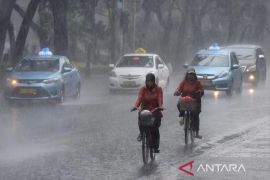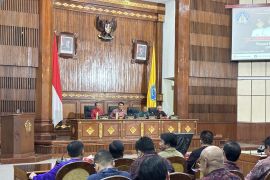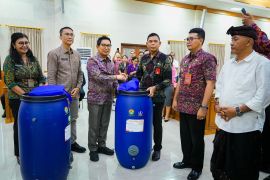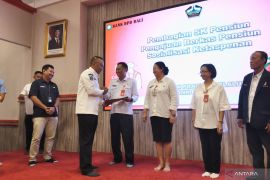Jakarta (Antara Bali) -An expert in geotechnical engineering advised against building liquefied natural gas (LNG) plant on shore to process gas from the Masela block, Maluku.
The area around the Masela block in the Arafura sea, is vulnerable to quake or tsunami disaster, Kriyo Sambodho from the marine technology faculty of the Surabaya Institute of Technology (ITS) said.
"With that risk I would not recommend development of the Masela block with on shore scheme," Kriyo said here on Tuesday.
He said according to the U.S. Geological Survey (USGS), the area around Masela block is frequently hit by strong quakes.
Data from the USGS said that in the period from 1900 to 2013, there were 2,248 times of earthquake around Masela with magnitude ranging from 5 to 9 MW and a depth of 300 kilometers.
Minor quakes with epicenter at a depth of up to 60 kilometers hit that area 1,474 times.
In the period of 1900-2015, quakes with magnitude of more than 7MW rocked that area nine times.
"Those data show that seismic activities are intensive around the Masela Block, therefore it should be taken into consideration in opting exploitation system for the development of the gas block, Kriyo said.
Masela block, operated by Japan' Inpex Corp., is believed to hold one of the largest gas reserves in the world.
Kriyo said based on the 'geo hazard' aspect, he would not recommend the processing of gas on shore that would necessitate the use of long pipeline to channel the gas to the processing facility.
Potential quakes could damage the pipe system, he said, adding buried pipes could be lifted and broken.
"The pipes needed is around 600 kilometer long to the Aru island or 160 kilometers to Saumlaki, that the possibility of being hit and damaged by quakes is high," he said.
Earlier, Coordinating Minister for Maritime Affairs Rizal Ramli called for a review of the development of the Masela gas block, a move which might further delay the construction of the country's largest deep water gas project.
Rizal said the liquefied natural gas (LNG)plant, which is part of the Masela gas project should be built on shore instead of offshore as planned by the operator Inpex Corp.
The minister said the onshore LNG plant should be built in Aru island to store and process the gas from the block.
The development of an onshore LNG plant and pipeline would be cheaper than the construction of an offshore floating plant, he said.
Building the floating plant would cost about US$19.3 billion as against only US$14.6 billion to US$$15 billion if it was built on shore, he added.
In addition, by building the plant onshore, it could turn Aru island into a major city, he said.
A Maritime Consortium, however, recommended construction of a floating LNG plant, favoring the plan proposed by Inpex.
The consortium of five state run institutes -- ITS Surabaya, shipbuilding company PT PAL Indonesia, Shipyard Polytechnic Surabaya, LHI-BPPT, and PT Biro Klasifikasi Indonesia -- made the recommendation after carrying out economic and technical studies on the project.
Technical aspect studied by the consortium covered safety, sea keeping, gas process and handling and geotechnical engineering and disaster.
Economic aspect covered time needed for construction, flexibility of operation, investment, impact on growth of the area and industry and local content.
Spokesman of the consortium Ketut Buda Artana, who is deputy rector of ITS, said the recommendation was intended to give an objective input for the government.
"Strictly no intention of the consortium to take side with any one of the alternatives. This is purely academic and technical discussion," Buda Artana said.
The recommendation is also in line with what President Joko Widodo said that Indonesia has long turned its back on the sea and now is the time to focus on maritime development.
"We need to think seriously about what the president has said. Among continental countries many have even used maritime concept in planning infrastructure including energy distribution," he said. (WDY)









